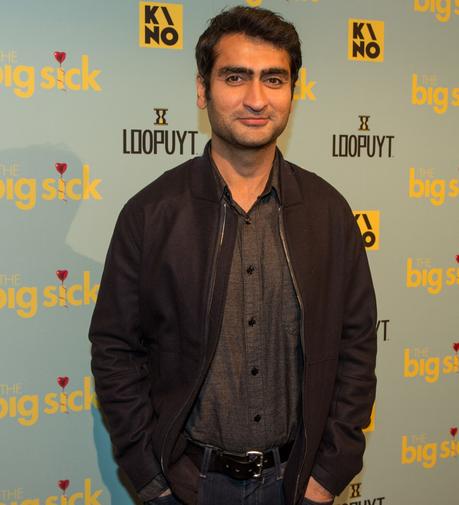Kumail Nanjiani thinks British TV is ‘more integrated than we are in America’

In a delightful piece of counter-programming this weekend, I didn’t see Dunkirk. I went to see The Big Sick, the little romantic-comedy starring Kumail Nanjiani and Zoe Kazan. I LOVED it. It was a very satisfying film on every level – it was laugh-out-loud funny, it worked as a love story, it worked a dark-humor comedy, and there was enough drama within the story to keep it anchored in reality. Kumail and Zoe’s characters meet and fall in love, even though Kumail is supposed to find and marry a nice Pakistani Muslim girl. Then Zoe’s character gets sick and ends up in a coma and Kumail has to spend weeks working out everything with her parents, played by Holly Hunter and Ray Romano. I can’t recommend this film enough to everyone! Anyway, Kumail has a new interview with The Telegraph and it’s lovely. HE is lovely. Some highlights:
What he thinks of Muslim/Pakistani representation in Britain. “Just from walking around and watching British television, I feel you are more integrated than we are in America. There are people who are matter-of-factly brown on television in Britain – there will be, like, an [Asian] constable… in America it’s always a statement. It’s like, ‘Oh, look at the diversity we have!’”
Whether ‘The Big Sick’ is a screw-you to Trump’s Muslim Ban. “No, that was never our intention. We didn’t want to make any kind of political or social statement. We just wanted to tell our story. We were aware that in American pop culture there weren’t that many depictions of matter-of-factly Muslim families, but really we just wanted to portray the relationship I have with my family, which is very loving, despite the disagreements.”
The pressure to have an arranged marriage was real. “In real life, it was more emails and phone calls and pictures. ‘Hey, you remember when we were at that party and there was that girl there? Anyway, she’s of a certain age now…’ There was a lot of that. There was a lot of pressure. I wasn’t into the idea, but also couldn’t imagine a world where it didn’t happen. I was just trying hard not to think about it.”
When Emily Gordon – then his girlfriend- got sick in real life: “I hadn’t been thinking about marriage before Emily got sick. But looking at her when she was first put into the coma, I thought to myself, ‘If she comes out of this, I’m going to marry her.’”
Dealing with her parents: “It was very awkward at first. I didn’t know how to be around grown-ups” – he was earning hardly any money and suffering from a severe case of extended adolescence at the time – “and slowly we became a unit, going through various levels of despair, elation, sadness, hopelessness and hope and bonding over this one thing that only the three of us could understand.”
What it means to be one of the few Muslim actors on TV: “There is pressure on each specific thing to represent the experiences of a whole group of people. But I don’t represent the Muslim community, I just represent my story. The only way to represent a whole group of people is to have a whole bunch of stories because there are as many different kinds of Muslims as there are different kinds of people.”
The film doesn’t have a political message, really: “I don’t think of myself as enlightened in the movie. When I tell my parents that I’m in love with Emily, it is my dad who has the last word in that scene. He says, ‘The American Dream doesn’t mean you can do whatever you want and not worry about other people.’ We are saying these are two different perspectives. One is not right and the other wrong – they are both people trying to do their best.”
[From The Telegraph]
I’m surprised that he thinks British film/television is somehow better at diversity than American film/TV. I don’t think either does diversity very well, but out of all the options, American television seems to be more willing to embrace diversity and inclusion. I’d also like to point out that it would be very easy for Kumail to talk sh-t about Donald Trump in every interview – and that’s what reporters would love too – but he hasn’t. He doesn’t want to be the Pakistani-American actor who becomes some kind of liberal/progressive symbol. And he shouldn’t have to be that guy. White actors, non-Muslim actors get to talk about their art without it becoming about politics and religion. Let Kumail be Kumail.
Photos courtesy of WENN.
Source: Kumail Nanjiani thinks British TV is ‘more integrated than we are in America’
3 total views, 3 views today
